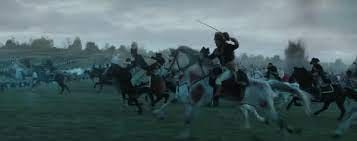THB #433: Napoleon
I find Napoleon very challenging to review, because it is so many things… and the challenge is not in reviewing each element, but in being comfortable with what it all adds up to as a film.
It is one of the greatest visual war epics ever put on film.
It is about a man who, in modern times, would be considered to be “on the spectrum,” not an idiot savant, but a savant with enormous limitations in all other areas.
It is about a great love in which one of the two lovers gives himself completely over to the other for reasons the movie doesn’t try much to explain and in which the other lover comes to believe in the love deeply only after challenging how absolute it is for the other lover. But it would be hard to call it a romance. It would also be hard to call it a marriage of convenience or non-romantic purpose.
It is about power, announcing from the start that misery creates revolutions and that, in turn, revolutions create misery. But our central character, Napoleon, wanders about, a step disconnected from the power he accrues.
Presumably in the name of accuracy, the writer and director don’t take the audience too high or too low emotionally through Napoleon’s journey. His natural arrogance, which should have stayed specific to his limited but powerful gifts, is on display from start to finish. But that speaks to the dilemma of this film… if your lead character is neither hero nor villain and doesn’t change significantly over the course of the story, where does that leave the audience?
I saw the film twice on one day, which is not unusual for me. I don’t know that I have reviewed a Ridley Scott film off of a single viewing in many years. Same is true for other top filmmakers and films that are challenging. But I can’t say, in this case, that the film changed my on the second view for me, which is unusual.
The film is built around 4 military engagements that made Napoleon and 3 that unmade him. (If my count is slightly off, sorry…) Wikipedia counts 18 winning engagements followed by 2 losses and then 12 more wins, a loss, then 18 more wins, and then a period from 1812 to 1815 in which the defeats were still the minority, but became greater and greater in scale.
Napoleon doesn’t get caught up on the massive amount of fighting that the Colonel tuned Brigadier General turned Top Counsel turned Emperor turned Exile actually did. Like most successful biopics, it takes its shots, narrowing the life into a consumable size. But like all biopics, that narrowing is a double-edged sword.
Keep reading with a 7-day free trial
Subscribe to The Hot Button by David Poland to keep reading this post and get 7 days of free access to the full post archives.




